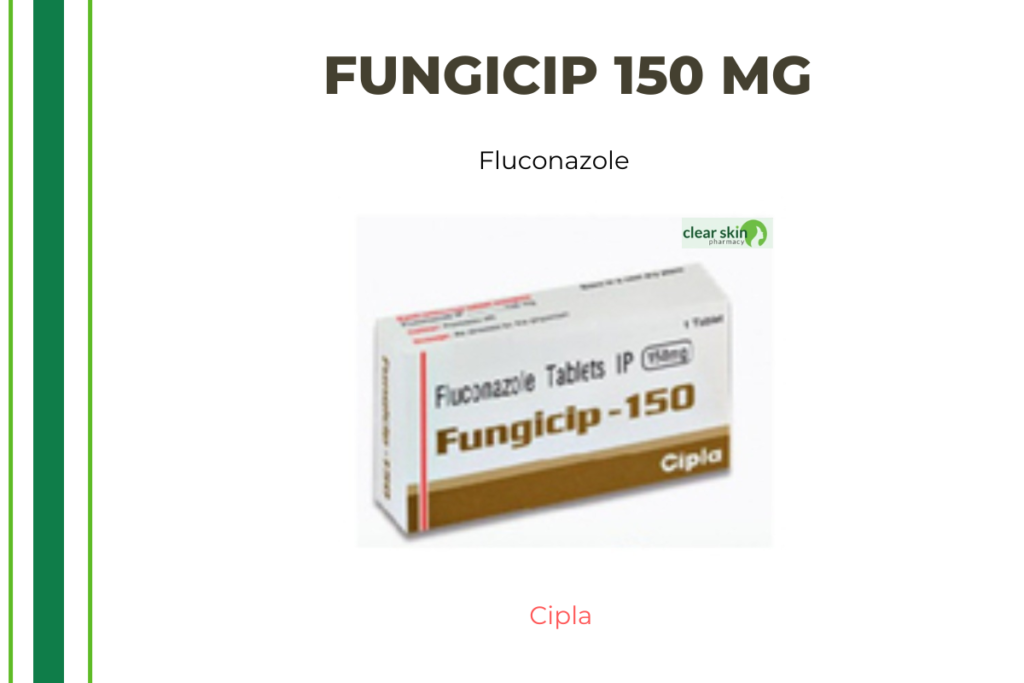Fungicip 150 mg
Fungicip 150 mg is a member of the ‘antifungal’ medicine class, which is used to treat a variety of conditions caused by fungi and yeast. A fungal infection occurs when a fungus invades and affects any part of the body, including the mouth, throat, esophagus, lungs, bladder, genital area, and blood. Fungicip 150 mg effectively cures fungal infections such as Vaginal Candidiasis (a yeast infection of the vagina caused by Candida), Candida urinary tract infection, and cryptococcal meningitis (fungal infection of the brain and spinal cord in AIDS patients). p>Fungicip 150 mg cannot be used to treat viral infections such as the common cold or influenza.
Fungicip 150 mg includes the active ingredient fluconazole, which kills or inhibits fungi and yeast by blocking an enzyme in fungi responsible for fat metabolism and interfering with the formation of the fungal cell membrane. As a result, fungal or yeast cells are killed or their growth is hindered. There are oral (tablet and solution) and injectable formulations of Fungicip 150 mg. Only take this medication if prescribed by your doctor. 150 mg of Fungicip can be taken with or without food.
Fungicip 150 mg frequently causes headache, diarrhea, nausea, stomach upset, dizziness, stomach discomfort, and altered food taste. p>If you have other unpleasant effects such as fever, chills, or flu-like symptoms, weakness, easy bruising, seizures, skin rashes, rapid or irregular heartbeat, shortness of breath, clay-colored stools, or jaundice, you should seek immediate medical attention.
Inform your physician if you are using or have just discontinued taking any other medications that may interact with Fungicip 150 mg. Examples include over-the-counter (OTC) drugs, herbal supplements, and vitamin supplements. Inform your doctor if you have other illnesses, heart problems, high blood pressure, HIV, mental illness, cancer, or malaria. Also, inform your doctor if you are pregnant or planning to become pregnant.
150 mg of Fungicip is used to treat fungal infections.

Medicinal Advantages
By inhibiting the creation of fungal cell membranes, Fungicip 150 mg kills fungus/yeast and inhibits its growth. Among other fungal or yeast infections, it is used to treat vaginal candidiasis, oropharyngeal candidiasis (thrush, oral thrush), esophageal candidiasis (candida esophagitis), candida infections (urinary tract infections, peritonitis), and cryptococcal meningitis. Fungicip 150 mg is also used to prevent candidiasis and coccidioidomycosis in patients undergoing bone marrow transplants while undergoing cancer or radiation therapy. Compared to other azole antifungal medications, Fungicip 150 mg is effective at treating infections of the soft tissues and lungs.
Use Instructions
Depending on the type of illness, people receive doses ranging from 50 to 400 mg per day of Fungicip 150 mg. There are both oral (tablet and suspension) and intravenous formulations available. Your physician may prescribe a single drug to treat your yeast infection. It is conceivable that your initial treatment for various infections will consist of two doses. 150 mg of Fungicip may be taken with or without food. Before using, vigorously shake the oral mixture and measure the dosage with a measuring device. Fungicip 150 mg is administered through intravenous infusion. Do not eat the medication if it seems cloudy, changes color, or contains particles.
Place in a cool, dry area out of direct sunlight.
Fungicip 150 mg Side Effects
The majority of adverse effects of Fungicip 150 mg do not require medical treatment and diminish over time. Fungicip 150 mg can cause headaches, diarrhea, nausea, stomach upset, dizziness, stomach discomfort, and a flavor alteration in meals. If these side effects linger longer than a week, seek immediate medical attention. Serious side effects of Fungicip 150 mg include rapid or irregular heartbeat, nausea, vomiting, extreme fatigue, easy bruising or bleeding, weakness, loss of appetite, jaundice (yellowing of the skin or eyes), influenza, dark urine, clay-colored stools, seizures, skin rash and itching, hives, swollen face, throat, tongue, lips, eyes, hands, feet, ankles, or lower legs, and trouble breathing or swallowing. If you have any of these adverse effects, contact your doctor immediately for urgent assistance.
Drug Recommendations
Although fluconazole’s harmful effects on the liver are uncommon, it is advisable to be aware of the risk. Severe hepatic responses such as necrosis (cell death), clinical hepatitis (liver inflammation), cholestasis (reduction or obstruction of bile production by the liver), and sudden hepatic failure have been reported in patients using Fluconazole. Fluconazole has been associated to liver damage, which has resulted in the deaths of individuals with serious underlying conditions. In such cases, Fluconazole therapy must be discontinued immediately. Fluconazole can induce cardiac complications (such as an irregular heartbeat), so it should be used with caution in individuals with heart conditions. Women who are pregnant or nursing should consult a physician before taking this drug. Fluconazole may not be suitable for those with a weakened immune system, diabetes, cancer, or low magnesium or potassium blood levels.
Interactions Between Drugs
Fluconazole may interact with medications used to treat mental illness (pimozide or quetiapine), antidepressants (reboxetine), antibiotics (erythromycin), ergotamine (to treat migraines or headaches); amiodarone (for heart problems); blood thinners such as warfarin; carbamazepine (to treat epilepsy); losartan (to treat high blood pressure); statins (to treat high cholesterol); anti-dia
Food Interactions with Fluconazole: No studies have demonstrated food interactions with fluconazole. However, non-starchy vegetables and gluten-free foods, as well as alcohol and caffeine, should be consumed in moderation.
Before taking Fluconazole, inform your physician if you have a history of adverse reactions to drugs, heart illness, liver or kidney disease, blood disorders such as acute porphyria, or low magnesium and potassium levels.
Safety Suggestions
ALCOHOL
When taking Fluconazole, alcohol should be avoided or drunk sparingly.
PREGNANCY
It is not suggested to use fluconazole during pregnancy since it can harm the fetus. There is a risk of spontaneous abortion in women using Fluconazole during the first trimester.
BREAST FEEDING
After a single 150 mg dose of fluconazole, breastfeeding can be resumed. After a high or multiple dose of Fluconazole, it is not advised to breastfeed. Contact your doctor if you observe any strange feeding, sleeping, or other behaviors in your infant.
DRIVING
If you experience seizures or vertigo after taking Fluconazole, you should not drive or operate heavy machinery.
LIVER
If you have a history of liver problems and are on Fluconazole, tell your doctor.
KIDNEY
If you have a history of renal disease and are taking Fluconazole, tell your physician.
No habit formation
Advice on Diet and Lifestyle
Unless your doctor recommends a particular diet, you should maintain your normal eating habits. Follow your doctor’s directions and take Fluconazole at regular intervals if you are taking it for longer than one day. Inform your pharmacist or doctor if you are taking any additional over-the-counter medications, herbal supplements, or vitamin supplements while using Fluconazole. Other drugs for GERD (Gastroesophageal reflux disease) or acid reflux, such as proton pump inhibitors, are advised. Consult your doctor if you have any of the following adverse effects: pounding heart, easy bruising, vomiting, or jaundice.
During yeast infections, a candida diet is recommended. This diet prohibits sugar, gluten, certain dairy products, alcohol, and the consumption of low-sugar fruits, non-starchy vegetables, and gluten-free foods. Due to a high-sugar or high-carbohydrate diet, Candida levels may rise in some individuals. To maintain a healthy lifestyle while taking Fluconazole, it is advised to avoid or limit alcohol and caffeine use.
Additional Information : This item is non-refundable.
Concerns of Patients
When a fungus invades, infects, and multiplies within the human body, this is known as a fungal infection. Fungi are capable of surviving in a range of habitats, including water, soil, air, and plants. Mouth, throat, esophagus, lungs, bladder, genital region, and blood can all be damaged by fungi. Mild fungal skin infections are able to cause rashes. Fungi that infect body organs such as the lungs can cause influenza or tuberculosis. Certain fungus, such as cryptococcal meningitis and blood infections, can be fatal. Candida-caused yeast infections of the vaginal area, esophagus, and urinary system are among the most common fungal infections.
FAQs
While using Fluconazole, you may consume whatever you choose. However, you should minimize your consumption of alcoholic beverages.
While using Fluconazole, driving is safe. Occasionally, you may feel dizzy or lightheaded. If this is the case, do not drive or ride a bicycle until you feel better.
Fluconazole should not be used if pregnancy is planned since it can harm the fetus. Therefore, notify your physician of your pregnancy objectives.
There is no clinical evidence that fluconazole affects fertility in either men or women.
Even if you feel better, you should continue taking Fluconazole until the entire course is finished. The treatment can last anywhere from one day to several weeks, months, or years.
Fluconazole is typically prescribed for a limited duration. Your doctor may prescribe it for a longer period of time, depending on the type and severity of your infection.
Fluconazole and oral contraceptives are compatible. Nonetheless, some research suggest that taking Fluconazole with a combo tablet may boost hormone levels in the body. If you have any adverse effects, consult your physician.
If you miss a dose, administer it as soon as you remember. If your next scheduled dose is quickly approaching, skip the missing dose and resume your normal dosing schedule.
Fluconazole may not be suitable for those with a weakened immune system, diabetes, cancer, or low magnesium or potassium blood levels.







Be the first to review “FUNGICIP 150 MG 1 tablet”